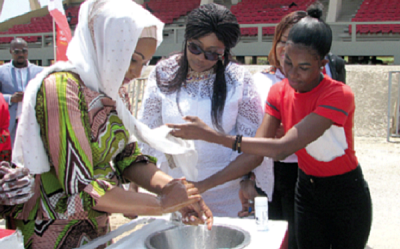
MMDAs urged to improve sanitation in markets
Timothy Ngnenbe & Juliet Akyaa Safo
This year’s Global Handwashing Day was marked in the country with a directive to all metropolitan, municipal and district assemblies (MMDAs) to take urgent steps to improve the sanitation situations in markets to prevent food poisoning.
The event is held annually across the world to sensitise people to the important role appropriate washing of hands plays in good personal hygiene and wellbeing.
Separate events were held at the Agbogbloshie Market and the Black Star Square in Accra yesterday at which the Minister of Sanitation and Water Resources (MSWR), Ms Cecilia Abena Dapaah, and the Second Lady, Mrs Samira Bawumia, urged the public to prioritise handwashing to stay healthy.
This year’s event in Ghana is on the theme: “Clean hands, a recipe for health,” with a focus on sensitising traders, school communities and people in other public places to the need to adopt the practice of handwashing.
National event
The national event at the Agbogbloshie Market was attended by Ms Dapaah, as well as the Chief Executive Officer (CEO) of the Accra Metropolitan Assembly (AMA), Mr Mohammed Nii Adjei Sowah; the CEO of Community Water and Sanitation Agency (CWSA), Mr Worlanyo Kwadjo Siabi, and other officials of the ministry and the AMA.
The celebration was dubbed “High5 for hand washing – Give us a high and we’ll teach five kids hand washing”.
Unilever Ghana Limited organised the event at the Black Star Square which was attended by Mrs Samira Bawumia, the Managing Director of Unilever Ghana, Mr Yeo Ziobeieton; the Deputy Minister of Education, Ms Babara Asher Ayisi; the Deputy Minister of Sanitation and Water Resources, Mr Patrick Boamah; The Netherlands Ambassador to Ghana, Mr Ron Strikker, among other personalities.
Improving
the trend
the trend
According to figures from the CWSA, only 30 per cent of Ghanaians washed their hands with soap and water in accordance with accepted sanitation practices.
The figure represents about nine million people of the country’s current population projected to be 30 million.
According to the CWSA, although the current situation was an improvement over that of 2001 when only 2.7 per cent and 6.2 per cent of mothers and children respectively washed their hands with soap, more work needed to be done to improve the trend.
The data also estimate that 10,000 children under the age of five die from pneumonia and diarrhoea in Ghana each year, according to a UNICEF report.
Directive
Ms Dapaah urged the MMDAs to take bold steps to stop the sale of food on the ground and close to refuse dumps to help ensure food safety for the public.
“It is common in our markets and communities to see food vendors serving food to customers with bare hands that have not been washed, people touching or sharing food without washing their hands, and food not properly stored to ensure that they are safe to eat.
I, therefore, direct all MMDAs to henceforth take sanitation issues seriously,” she stressed.
Disease prevention
Mrs Bawumia called for priority to be given to handwashing, saying it was an effective and inexpensive way to prevent infectious diseases.
“Simple handwashing practices have been described as the surest way to prevent diseases causing death among children below the age of five,” she said.
A ban
For his part, Mr Sowah said the AMA would embark on an exercise to clear all traders who sold food on the ground, especially along the shoulders of the road.
For his part, Mr Sowah said the AMA would embark on an exercise to clear all traders who sold food on the ground, especially along the shoulders of the road.
“We have started engagements with all stakeholders and very soon we will ban the sale of food on the bare floor because we cannot continue to risk people’s lives through acts of negligence,” he stressed.